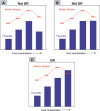Dietary restriction in Drosophila: delayed aging or experimental artefact?
- PMID: 17465680
- PMCID: PMC1857724
- DOI: 10.1371/journal.pgen.0030057
Dietary restriction in Drosophila: delayed aging or experimental artefact?
Abstract
Lifespan can be extended by reduction of dietary intake. This practice is referred to as dietary restriction (DR), and extension of lifespan by DR is evolutionarily conserved in taxonomically diverse organisms including yeast, invertebrates, and mammals. Although these two often-stated facts carry the implication that the mechanisms of DR are also evolutionarily conserved, extension of lifespan could be a case of evolutionary convergence, with different underlying mechanisms in different taxa. Furthermore, extension of lifespan by different methods of DR in the same organism may operate through different mechanisms. These topics remain unresolved because of the very fact that the mechanisms of DR are unknown. Given these uncertainties, it is essential that work on the mechanisms of DR is not clouded by imprecise descriptions of methods or by technical problems. Here we review the recent literature on DR in Drosophila to point out some methodological issues that can obscure mechanistic interpretations. We also indicate some experiments that could be performed to determine if DR in Drosophila operates through similar mechanisms to the process in rodents.
Conflict of interest statement
Competing interests. The authors have declared that no competing interests exist.
Figures

Similar articles
-
Water- and nutrient-dependent effects of dietary restriction on Drosophila lifespan.Proc Natl Acad Sci U S A. 2009 Nov 3;106(44):18633-7. doi: 10.1073/pnas.0908016106. Epub 2009 Oct 19. Proc Natl Acad Sci U S A. 2009. PMID: 19841272 Free PMC article.
-
Dietary restriction extends lifespan in wild-derived populations of Drosophila melanogaster.PLoS One. 2013 Sep 10;8(9):e74681. doi: 10.1371/journal.pone.0074681. eCollection 2013. PLoS One. 2013. PMID: 24040317 Free PMC article.
-
Dietary restriction in Drosophila.Mech Ageing Dev. 2005 Sep;126(9):938-50. doi: 10.1016/j.mad.2005.03.023. Mech Ageing Dev. 2005. PMID: 15935441 Review.
-
Calories do not explain extension of life span by dietary restriction in Drosophila.PLoS Biol. 2005 Jul;3(7):e223. doi: 10.1371/journal.pbio.0030223. Epub 2005 May 31. PLoS Biol. 2005. PMID: 16000018 Free PMC article.
-
Diet restriction in Drosophila melanogaster. Design and analysis.Interdiscip Top Gerontol. 2007;35:115-36. doi: 10.1159/000096559. Interdiscip Top Gerontol. 2007. PMID: 17063036 Review.
Cited by
-
The effect of sexual harassment on lethal mutation rate in female Drosophila melanogaster.Proc Biol Sci. 2013 Jan 7;280(1750):20121874. doi: 10.1098/rspb.2012.1874. Proc Biol Sci. 2013. PMID: 23173200 Free PMC article.
-
Water- and nutrient-dependent effects of dietary restriction on Drosophila lifespan.Proc Natl Acad Sci U S A. 2009 Nov 3;106(44):18633-7. doi: 10.1073/pnas.0908016106. Epub 2009 Oct 19. Proc Natl Acad Sci U S A. 2009. PMID: 19841272 Free PMC article.
-
Independent signaling by Drosophila insulin receptor for axon guidance and growth.Front Physiol. 2014 Jan 20;4:385. doi: 10.3389/fphys.2013.00385. eCollection 2013. Front Physiol. 2014. PMID: 24478707 Free PMC article.
-
Increased Akt signaling in the mosquito fat body increases adult survivorship.FASEB J. 2015 Apr;29(4):1404-13. doi: 10.1096/fj.14-261479. Epub 2014 Dec 30. FASEB J. 2015. PMID: 25550465 Free PMC article.
-
Effects of Temperature on Lifespan of Drosophila melanogaster from Different Genetic Backgrounds: Links between Metabolic Rate and Longevity.Insects. 2020 Jul 25;11(8):470. doi: 10.3390/insects11080470. Insects. 2020. PMID: 32722420 Free PMC article.
References
-
- Alpatov WW. Experimental studies on the duration of life. XIII. The influence of different feeding during the larval and imaginal stages on the duration of life of the imago of Drosophila melanogaster . American Naturalist. 1930;64:37–55.
-
- Loeb J, Northrop JH. On the influence of food and temperature upon the duration of life. J Biol Chem. 1917;32:103–121.
-
- Pearl R. The biology of death–VI. Experimental studies on the duration of life. The Scientific Monthly. 1921;13:144–164.
-
- Pearl R. The rate of living. London: University of London Press; 1928. p. 185.
-
- Kopec S. On the influence of intermittent starvation on the longevity of the imaginal stage of Drosophila melanogaster . British J Exp Biol. 1928;5:204–211.
Publication types
MeSH terms
Grants and funding
LinkOut - more resources
Full Text Sources
Medical
Molecular Biology Databases

